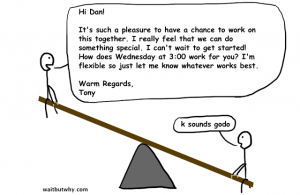 Email is a necessary part of everyday life today. This cartoon-illustrated article outlines many of the most uncomfortable aspects of email, and provides suggestions for minimizing discomfort.
Email is a necessary part of everyday life today. This cartoon-illustrated article outlines many of the most uncomfortable aspects of email, and provides suggestions for minimizing discomfort.
waitbutwhy.com/2013/12/11-awkward-things-about-email.html
Category: 8.5 Interpersonal Computing: From Communication to Communities
T he Internet was conceived as a way of connecting computers, but its inventors quickly realized that the Internet was a way of connecting people. Now one of those founders, Vint Cerf, is working with Peter Gabriel, Diana Reiss, Neil Gershendfeild, and others to bring dolphins, bonobos, elephants, and other species into the Internet community. This TED talk gives us a peek at the early stages of a research project that could profoundly change our relationship with non-human inhabitants of our planet—and possibly other planets.
he Internet was conceived as a way of connecting computers, but its inventors quickly realized that the Internet was a way of connecting people. Now one of those founders, Vint Cerf, is working with Peter Gabriel, Diana Reiss, Neil Gershendfeild, and others to bring dolphins, bonobos, elephants, and other species into the Internet community. This TED talk gives us a peek at the early stages of a research project that could profoundly change our relationship with non-human inhabitants of our planet—and possibly other planets.
ted.com/talks/the_interspecies_internet_an_idea_in_progress.html
 The Internet makes it possible for people to collaborate on a massive scale, working together to accomplish tasks that might otherwise be impossible. The world of online collaboration is changing rapidly—and changing our lives in the process. Many TED talks and NPR podcasts have helped us to understand the applications and implications of collaborative technology. In this fascinating radio program, TED and NPR collaborate to explore collaboration by combining excerpts from several TED talks with interviews and commentary.
The Internet makes it possible for people to collaborate on a massive scale, working together to accomplish tasks that might otherwise be impossible. The world of online collaboration is changing rapidly—and changing our lives in the process. Many TED talks and NPR podcasts have helped us to understand the applications and implications of collaborative technology. In this fascinating radio program, TED and NPR collaborate to explore collaboration by combining excerpts from several TED talks with interviews and commentary.
www.npr.org/2013/07/13/197986218/why-we-collaborate
Crowdfunding—funding a project by asking many people for small contributions—has exploded in popularity because of Internet tools and social networks. Crowdfunding is being used to fund high-tech ventures, microbusinesses, charities, and artistic expressions. In this entertaining, moving TED talk, musician Amanda Palmer of the Dresden Dolls talks about a dimension of crowdfunding that’s rarely discussed: the emotional connections that happen when we ask friends, fans, or strangers for what we need. She argues that Internet tools aren’t as important as our attitude about asking.
ted.com/talks/amanda_palmer_the_art_of_asking.html
The Internet naturally lends itself to peer-to-peer communication and commerce. In this short TED talk Robin Chase explains how she’s using technology to make car sharing easy and profitable.
http://www.npr.org/blogs/alltechconsidered/2012/12/10/166890714/forget-the-register-stores-use-mobile-to-make-sales-on-the-spot
Will Your Phone Read Your Mind in 2016? Ask IBM
asmarterplanet.com/blog/2011/12/the-next-5-in-5-our-forecast-of-five-innovations-that-will-alter-the-landscape-within-five-years.html
As noted in Chapter 1’s Inventing the Future, predicting the future isn’t easy. But when the predictions are backed by one of the world’s biggest technology innovators, they’re worth considering. In this short, clever video, IBM describes and illustrates “5 in 5″— five technological breakthroughs that could reshape our lives within five years.
www.ted.com/talks/luis_von_ahn_massive_scale_online_collaboration.html
If you use the web, you’re almost certainly part of a global team that’s digitizing the world’s books, one word at a time. How are you helping digitize one hundred million words each day? In this entertaining, mind-expanding TED talk, Luis von Ahn explains how a group of researchers created reCAPTCHA and turned one of the web’s big time-wasters into a crowdsourcing project involving ten percent of the world’s population. He also describes an emerging project to apply the same visionary approach to language translation.
Facebook, Twitter, and other social media are overflowing with stories of real people living real lives. Or are they? This thought-provoking article by Paul Ford takes a hard look at what’s missing in the stories people tell through social media. This is one of the best pieces we’ve seen on the changing roles of social media and traditional journalism.
The Internet is a marvelous medium for free-flowing discussion and information sharing. But it can also be an amplifier of hatred and rage—especially on sites where opinions can be posted anonymously.
What happens to your online identity after you die? This short TED talk explores this question and suggests some answers.